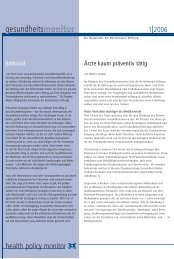The 2nd HPD report - Health Policy Monitor
The 2nd HPD report - Health Policy Monitor
The 2nd HPD report - Health Policy Monitor
- TAGS
- health
- policy
- monitor
- www.hpm.org
Create successful ePaper yourself
Turn your PDF publications into a flip-book with our unique Google optimized e-Paper software.
the extent to which private financing should contribute to the<br />
financing of long-term care.<br />
Pharmaceutical expenditures are rising steeply in many countries.<br />
<strong>The</strong> difficult tradeoff between health policy objectives and<br />
competitive market objectives makes any regulation of pharmaceutical<br />
markets a complex issue. <strong>Policy</strong>makers in European<br />
Union countries must also consider supranational regulation.<br />
Those who seek to regulate the pharmaceutical industry must<br />
take into account an array of contradictory factors. <strong>The</strong> stimulation<br />
of production, research and development can lead to positive<br />
effects on employment and trade balance-important economic<br />
goals. On the other hand, the road to affordable health care may<br />
call for restricting certain behaviors of the industry.<br />
Standard measures during the past years mainly comprise<br />
cost-containment policies concerning pricing, reimbursement or<br />
increased private responsibilities. Some reforms establish effectiveness<br />
criteria and/or cost-effectiveness assessment as the basis<br />
for drug pricing, as <strong>report</strong>ed from Austria, Finland and France.<br />
Others feature the introduction or promotion of generic drugs, as<br />
in Finland and Spain. Information strategies addressing providers<br />
or patients constitute another pattern of reform options, as in<br />
Finland and New Zealand. Recent policy discussions have devoted<br />
greater attention to quality aspects. Thus, England created the<br />
National Institute for Clinical Excellence (NICE), and Finland<br />
established a Development Center for Drug <strong>The</strong>rapy.<br />
During the past decades, while financing issues and structural<br />
health policy reform drew much attention, the health care workforce<br />
stood comparatively low on the reform agenda even though<br />
the knowledge and skills of health care professionals hold the key<br />
to delivering high-quality services in a rapidly changing health<br />
care environment. <strong>Health</strong> challenges of aging societies, quality<br />
management, integrated care and evidence-based medicine—to<br />
name just a few of the relevant issues—all require specialized<br />
training. When it comes to meeting the needs of tomorrow’s<br />
health care systems, the constant adaptation of medical and<br />
nonmedical professional training, both primary and advanced,<br />
ranks among the most important health policy tasks. Governments<br />
and decision-makers have only recently begun to address<br />
these challenges.<br />
19<br />
Pharmaceutical<br />
policy<br />
Human resources<br />
and health






